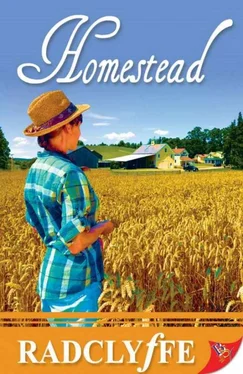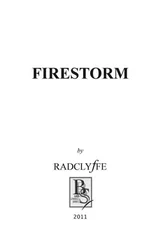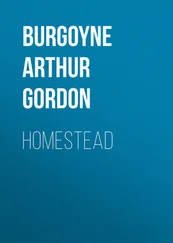Most of the places hadn’t changed since the last time she’d ridden through with Tess behind her on the motorcycle. They’d come down from the lake together a time or two, once when she’d told Tess she wanted to see where she lived, once when Tess had asked her for a ride back to the farm. She remembered meeting Tess’s stepfather when he’d been on his way out to the fields, recalling the hard glint in his eyes as he’d surveyed her, the way he’d asked her name and how she knew Tess. He hadn’t been belligerent, but her gut told her he was dangerous. In hindsight, she’d been right. Ray Phelps. Tess rarely spoke of him except to say she’d been eight when her mother had married him and fourteen when her mother had died in a car accident on an icy winter road. Phelps had died not that long ago—Clay’s father had sent her an e-mail with the news. She’d been surprised at the time, wondering why her father had kept tabs on the man. Whatever the reasons, he was out of the picture, and the farm was Tess’s now. Tess looked as if the life suited her.
Clay walked to the end of the tiny business district where the residential houses began, crossed the street, and headed back to the diner. Ford, Dodge, and Chevy pickup trucks crowded both sides of the street in front of the diner. Inside, the few tables and most of the stools at the long counter were filled with men and women in work clothes like hers, sitting silently with newspapers in front of them or talking quietly over coffee. She threaded her way down the long, narrow aisle to a stool at the far end of the counter, aware of everyone watching her, some with blatant curiosity, others with casual interest.
A young woman, maybe twenty, with light-brown hair pulled back in a ponytail and a sky-blue scoop-neck T-shirt that said Susie’s Café in white letters, headed her way with a coffeepot in her hand. She filled the white porcelain mug in front of Clay and said, “Need a menu?”
“No, I’m good,” Clay said, nodding at the coffee. “How did you know?”
The girl smiled. “Nobody comes in here before five who doesn’t want coffee.”
“True enough.” Clay poured some milk into the coffee, sipped it, and raised her eyebrows. “This isn’t Maxwell House.”
“Sure isn’t. Green Mountain French Roast, ground fresh for every pot.”
“Things are getting gentrified around here.”
The girl snorted. “Not hardly, but there’s no reason we can’t have good coffee. So what will you have?”
Clay scanned the whiteboard on the wall across from her where daily specials were written in black script. “I’ll have that farmer’s omelet. Whole-wheat toast. Thanks.”
“Sure enough.”
Clay drank the very good coffee and ate the equally good cheese, ham, mushroom, spinach, sausage, and potato omelet while organizing her day in her mind. Around her, the low murmur of voices gave her a comforting sense of community, something she never really noticed in big-city restaurants, where no matter how many people were congregated, everyone seemed to occupy separate islands in a vast ocean. Disconnected, alone. Another thing she’d gotten used to.
Meal done, she was reaching for the bill when a strain of conversation rose above all the others, catching her attention.
“Heard they’re going to start drilling pretty soon,” a husky male voice said from somewhere down the counter.
Clay let the bill lie where it was and motioned for another cup of coffee. As she worked on her refill, she listened.
“I hear Pete Townsend’s trying to put a stop to all that,” a second man said. “Doesn’t want them contaminating his land.”
“Pete doesn’t want anything to change, that’s his deal. Me,” yet another person chimed in, “I think it’s a good idea. These gas people—they bring money, lots of it. Not just for the ones who sell them the rights, either, but for everybody. They got to truck it all out, don’t they? They gotta build roads for them big trucks, they gotta have houses for the people who’re working there. They gotta eat, right? I’ve read about these things. Everybody ends up making money.”
“Yeah,” a woman piped up, “unless you happen to be one of the ones whose water gets contaminated by all the stuff they flush up along with the gas. The Whiteside Creek runs right through where they’re supposed to be drilling, and most of our land gets water from there. If that water gets tainted, our crops and our livestock are going to get sick. Maybe us too.”
Clay shot a glance down the counter at the woman. Fortysomething, blond hair held back with a simple gold clip, elegant features, and diamond-hard blue eyes. Pretty and pissed.
“I’m with Pete,” the woman went on, “and so are a lot of us. We don’t need these people coming up from wherever they’re coming from to take what they want and then leave us with the mess. This land is farmland, that’s what it’s meant for, and that’s what we ought to be paying attention to.”
The hubbub of voices grew louder as people tossed out opinions, talking over each other, dissecting the issues. Clay had heard it all before and often came up against prejudices fostered by the lack of facts. People only knew what they’d read or heard, usually not from the fracking companies. The media always liked a good story, and good stories were often one-sided. In most situations, an advance team from NorthAm came into an area to deal with community relations well before site work began, but this time she’d been tossed into the fire and she’d have to deal with resistance on her own. But not in the diner at five in the morning—she wanted to do it face-to-face, family by family, for starters.
Just as she was making a mental note to have Ella set up a town meeting once she had a sense of where most of the community was going to fall out, Ella walked in. All conversation stopped. Clay might have gotten a few curious looks, but Ella, even in casual clothes—which for her meant tailored black pants, a form-fitting white tee, and a light blazer to cover her weapon—drew outright stares. She strode over to Clay as if oblivious to the attention, but Clay knew she could recite exactly where everyone was seated and what they looked like.
“Morning,” Clay said.
“Couldn’t sleep?” Ella nodded to the counter girl who set down a full mug of coffee by her right hand. “Thanks.”
“Just can’t wait to get started,” Clay said.
Ella laughed. “I’ll bet. I’m guessing we’ll need a town meeting before this is done.”
“You guessed right.” Clay thought of the conversations she’d just heard, thought of Tess’s automatic distrust of her and the company. She really needed to talk to the farmers, including Tess.
That idea was the best thing about the morning so far.
* * *
Tess walked her best milker into the milking stall and tethered her with a loose lead rope to the ring mounted on the wall. After dipping each udder into a container of Betadine, she attached the suction tubes to each one and started the automatic milking machine. Immediately, thick white fluid streamed into the collection tubes. Tess ran her hand down the cow’s flank as the milk ran into the sterile lines that carried the milk to the storage tanks. On a good day, this cow—Buttercup—would give her over a hundred gallons of milk. And Buttercup’d eat the same amount of food—at least a hundred pounds of corn, hay, and grain—and drink fifty gallons of water. Multiplied by eighty, the herd consumed an incredible amount of feed. She relied on her fields for the corn and alfalfa to sustain her herd, and if she didn’t get it this year, she’d be dipping into her bank account to supplement before long.
The door at the far end of the barn creaked open, letting in a shaft of early-morning sun, and her foreman, Tomas, a suntanned fifty-year-old whose hair was still as coal black as it had been when he was twenty, strode toward her. Tomas had been on the farm as long as she could remember, starting as a young man working the fields. He’d grown with the needs of the business, taking courses in animal husbandry at night at the community college where Tess had eventually gotten her degree. He’d never wanted to leave and buy his own farm, saying he could never find a place as beautiful to work or people as friendly to work with.
Читать дальше











